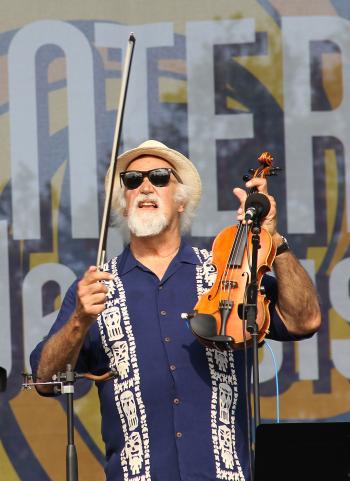
Michael Doucet performs at Festival International in Lafayette in April.
(The Daily Review Photo by Harlan Kirgan)
Musician finds Cuban ties to Cajun music
LAFAYETTE (AP) — Michael Doucet of the two-time Grammy-winning Cajun band BeauSoleil was sitting in a colonial hotel room overlooking a square in Cuba when he heard music with a very familiar old-timey flavor.
“Man, I thought I had gone to heaven, I was listening to Dennis McGee orchestra hits,” said Doucet. McGee was one of the first Cajun musicians to be recorded, with a number of sessions in 1929 and 1930.
Doucet opened the shutters to see an orchestra with two violins, a viola, a clarinet, a trumpet, a trombone and the requisite percussion.
“They were playing turn-of-the-century Cuban music called Danzon and it was so much like the music of turn-of-the-century New Orleans,” said Doucet.
The Spanish cultural and musical connection between Havana and New Orleans has been around since colonial times.
“It was just amazing just to hear that,” said Doucet. He said he got video and audio recordings on his iPhone, but lost the phone.
Despite rationing and other hardships on the island, Doucet said music is everywhere, from high school kids playing, to poets and trios “who’ve been playing together for, like, 40 years,” he said.
“There was music every day all day and all different kinds of musicians,” he said. “I had a chance to play with a bunch of people and read music with them and perform with them. It was just wonderful.”
That was why he booked the tour with Festival Tours International, which specializes in musical tours.
“We’ve been playing folk, Cuban music for years and to really get into it and to see how they do it, which is just how we do it,” Doucet said, who took the trip sans BeauSoleil through Festival Tours International. “It’s totally a folk music, the turn-of-the-century music.”
The tour group of nearly two dozen included Hollywood producers, doctors, musicians and regular folks, Doucet said.
“For everybody, it was just to go and experience this country of music,” Doucet said. “Everybody was music lovers and experienced this country before it changes, because it has changed a lot and I think it will continue to change.”
One thing that hasn’t changed too much since the mid- to late 1950’s revolution are the automobiles.
“There’d be a whole car, like an Oldsmobile ‘58 and then after that there’ll be like some kind of funky wagon hauling about 20 people on it by a mule,” said Doucet. “And then there’ll be like a Russian car which looks like a Fiat that’s falling apart and then there’ll be Chinese bus. Then there’ll be another old car.
“So that’s how it goes,” he said. “How they keep it running, I imagine they all have Russian parts by now. But there are some beautiful cars over there — from Cadillacs to Chevys — probably the latest ones are probably the 60’s and things like that.”
Doucet said the guide told them before the trip to bring anything they could leave for the Cuban people.
“So I brought a lot of violin strings, guitar strings, music — people just don’t have that,” said Doucet. “Clothes. I brought a suitcase and basically left my suitcase. Everything just means something to them. They’re very creative.”
The fiddling front man also brought a bunch of baseballs, courtesy of St. Thomas More High School.
“And man, I was the biggest hit. I threw a lot of baseballs to kids and we’d play catch and everything,” he said. “They love baseball over there.”
Doucet saw similarities between Cuba and his hometown in their attitude toward music.
“The music is so rich. In Louisiana, everybody plays music,” he said. “Well, it’s pretty much the same way there. And they just do it.”
The comparisons, however, only go so far.
“If they want to learn music, education is just given to them — no matter how high they go, it’s free. Just like health care,” said Doucet. “But then it’s in kind of in that socialist form. They’re free in a certain way. They’re free to think and do whatever, but not so much — they don’t want to let them get on the Internet and stuff like that.
“They don’t want them adjust to the outside world and be accustomed to that,” he said. “But the outside world is there.
“Culturally, that’s a whole different subject, but very strange and different,” Doucet continued. “It’s like a Third World country. It’s beautiful and the people are totally educated and totally nice because there’s a big elephant in the room that keeps them down.
“People watch you. People can’t leave,” he said. “And that’s how it is.”
- Log in to post comments
